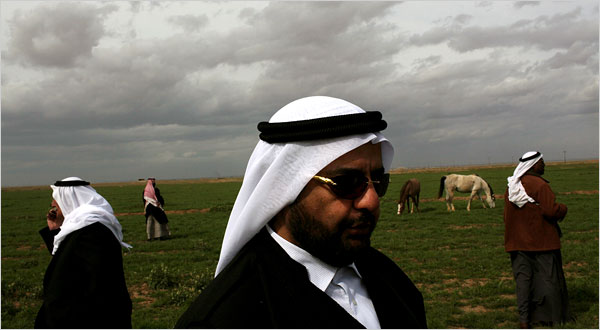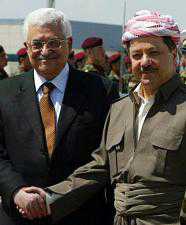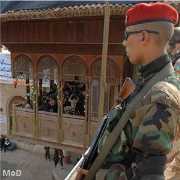 Jehad Nga for The New York Times Sheik Abdullah Humedi Ajeel al-Yawar, seen with his Arabian horses, mobilized tribes in January to help Sunni Arabs gain control of Nineveh’s provincial council.
Jehad Nga for The New York Times Sheik Abdullah Humedi Ajeel al-Yawar, seen with his Arabian horses, mobilized tribes in January to help Sunni Arabs gain control of Nineveh’s provincial council.
By CAMPBELL ROBERTSON and STEPHEN FARRELL Published: April 17, 2009
RABIA, Iraq – Sheik Abdullah Humedi Ajeel al-Yawar says there is no hidden reason why he still flies the three-starred flag of the old Iraqi government from the towers and guard posts of his ranch near the Syrian border.
Multimedia
 Interactive Graphic
Interactive Graphic
Iraq’s Fault Line
 The New York Times
The New York Times
The Sunni political class has regained strength in Rabia.
It is a practical matter, he explained. The Iraqi government has yet to come up with a permanent new design, so why change the flags until they do?
But the sight of the flag and the confidence oozing from northern Iraq’s new Arab rulers send an unavoidable message: The old order has returned.
In the first years after the invasion, Sunni Arabs, the minority that long ran Iraq and who make up the majority in the northwest, mostly stayed away from politics. Many joined or supported the insurgency as the American-allied Kurds took power by default, giving them a political and military ascendance out of all proportion to their numbers in Nineveh Province.
But in the prelude to Nineveh’s provincial council elections in January, the tribes of the countryside led by the nationally ambitious Sheik Abdullah, and the urban Sunni Arab elite led by a polished businessman from Mosul whose brother already sits in Parliament, came back with a vengeance.
Riding a wave of resentment against the Kurds – and openly trumpeting influence with insurgents – they came to control Iraq’s second most populous province, thus overseeing not only regional decision-making, but also the coffers and patronage that go with it.
The return of this Sunni political class, some of them suspected of ties with Saddam Hussein’s Baath Party, has come via the ballot box. But it prompts crucial questions: whether enfranchisement quickens ethnic healing, or whether the Sunni victors’ hard edge against the Kurds sets up future ethnic conflict.
So far it does not look good. At the first Nineveh provincial council meeting on Sunday, the victorious Sunni list, Al Hadba, with 19 of 37 seats, froze the second-place Kurdish list out of all official positions.
In return the Kurds, controlling 12 seats, threatened to boycott the council and even refuse to accept government services in areas where they dominate.
The dispute has implications far beyond the northern fault line. Three hundred miles south in Baghdad, the central government led by Iraq’s majority Shiite Arabs must decide which presents the biggest threat: the political ambitions of Mr. Hussein’s once ruling Sunni Arab minority, or the territorial ambitions of the Kurdish minority who claim that some northern areas administered by Baghdad should rightfully be added to their three provinces, two of which border Nineveh.
With national elections in less than 12 months, Prime Minister Nuri Kamal al-Maliki, who has competing centrist and Islamist constituencies, must also decide how far he can take reconciliation with the former ruling Sunnis. Tension rose last week when one of Mr. Hussein’s former top deputies called for the toppling of Mr. Maliki’s government and for the outlawed Baath Party to retake control.
American officials here see reasons for optimism, that people who might have used violence in the past have turned to politics. Lt. Col. Guy Parmeter, commander of the American forces in the center of Nineveh, said he felt that fighting among Al Hadba and opposing groups was now less likely.
“I think that any conflict between them, they’re going to stay in the dialogue phase,” he said.
American officials acknowledged that Al Hadba was heavily influenced by the Baath Party. Three potential Hadba candidates were disqualified for past associations with the party, and the list’s leaders assert that former Baathists should be included in the government, while conceding that the party should remain banned. Sheik Abdullah points out that the tribes, the source of his support, pre-date the country, never mind one party.
Others, and not only Kurds, are wary of Nineveh’s new rulers. More than one Sunni Arab sheik accused Al Hadba of being in league with violent extremists.
“When the election was in Mosul four years ago, when somebody went to vote, the Islamic State of Iraq cut off his hand,” said Sheik Massoud Suleiman al-Sadoon, a tribal leader in Zumar. “Why this time did all the bad men say ‘Vote for Al Hadba?’ ”
In his office in Mosul, Al Hadba’s leader, Atheel al-Nujaifi – just before he was installed as Nineveh’s governor – spoke of a willingness to make overtures to insurgents, or as he put it, people “who oppose the political system and might commit some kind of violence,” although he drew the line at reaching out to religious extremists and criminals.
The lack of violence on election day, he explained, was not only a result of a security lockdown. His party contacted “influential people,” he said, to ensure that votes would be cast peacefully.
The Kurds mutter that Al Hadba’s proximity to extremists could render irrelevant its stated intentions to rule broadly. The party’s constituency, they allege, will force it to uphold the extreme elements of its leaders’ rhetoric.
“They have to balance their position between the reality of the Iraqi government, and to take orders from the darkness, from the groups who voted for them, who asked people to vote for them,” said Khasro Goran, the head of the Kurdistan Democratic Party in Mosul.
Kurdish political leaders argue further that the alliance of Arab tribal and urbane elite is a marriage of convenience arising from their shared antipathy to the Kurds.
Mr. Nujaifi says that he has nothing against the Kurds and that he is not opposed to a federal solution to the question of Kurdish territorial claims. But he and Sheik Abdullah are unequivocal on one point: in an Arab-majority province with long-simmering land disputes, there is and will be no Kurdish land in Nineveh. But the coalition’s dynamic appears more complex than mere opposition to Kurdish expansionism.
The near uniformity of the Sunni Arab vote in the north also comes from a sense, shared across ragged desert towns and mountain villages, that Kurdish rule failed in Nineveh – badly.
Towns, only recently free of Sunni extremist control, have some of the worst rates of connection to the water network in Iraq, according to the United Nations. Electricity is lacking in most of the province, and unemployment is high.
The severity of the problems is one reason Americans say Al Hadba will be forced to put pragmatism, and political survival, over ideology.
Sheik Abdullah is frank about his readiness to further his already nascent ambitions into other provinces and dissolve Al Hadba if it does not deliver improvements. And Mr. Nujaifi’s campaign focused on installing competent administrators.
Iraqis from the north, those from Mosul in particular, have long had a reputation for hardened survival instincts.
“There isn’t a lot of change in Mosul society,” Mr. Nujaifi explained. “After we think that these problems are over, this society will return again as before. And that’s our image.”
Atheer Kakan contributed reporting.





